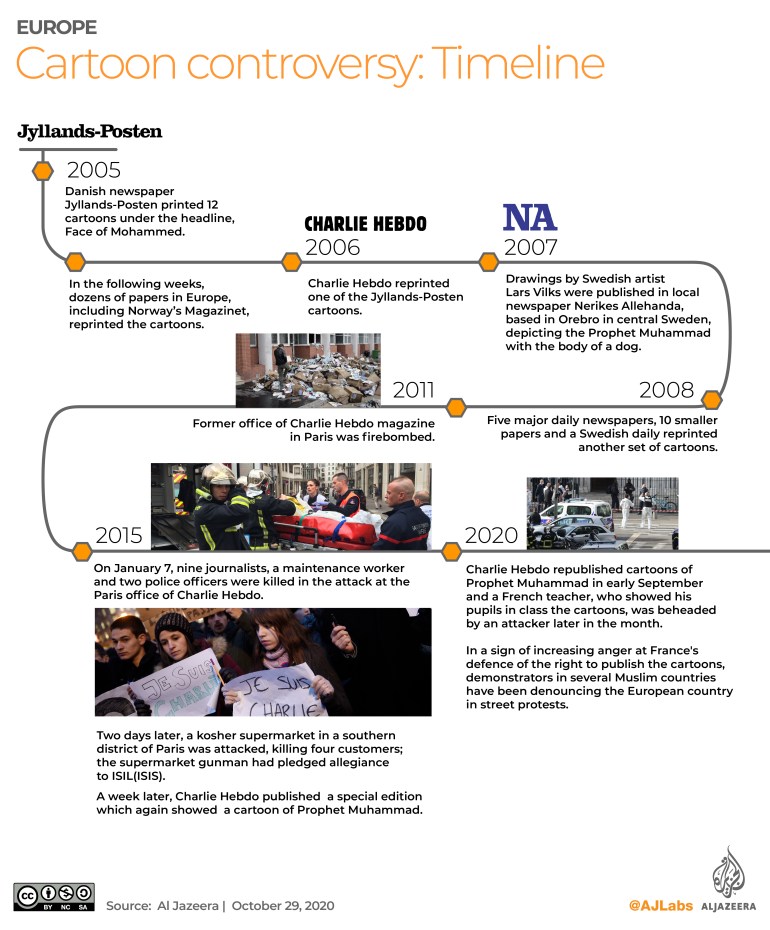France on edge five years after Paris attacks
Ceremonies held as France is again under high alert after three attacks since September, which have killed four people.

Five years after ISIL waged the deadliest attack during peacetime in modern-day France, Prime Minister Jean Castex paid tribute to those killed, with the country once again on its highest security alert.
The attackers killed 130 people and wounded hundreds more in a series of coordinated attacks on entertainment venues on November 13, 2015, in a night of violence that etched a deep scar in the nation’s psyche.
Keep reading
list of 3 itemsEurope’s cartoon controversy
France church attack: What we know so far
Castex went first to the Stade de France, where the attack began with suicide blasts outside the stadium during a football match and laid a wreath of flowers at the foot of a wall.
Then-President Francois Hollande had been attending the match in 2013, and was evacuated when explosions were heard minutes into the game.
The assault also targeted cafes, restaurants and the Bataclan concert hall – sites which have been under a close police watch in the run-up to Friday’s anniversary.
France is reeling again from several attacks since early September.
“We face a double-edged threat: from outside, people sent from abroad, and a grave internal threat, people who are amongst us, our enemies within. Those threats are increasing,” Interior Minister Gerald Darmanin told Franceinfo radio.
US President-elect Joe Biden also paid tribute to the victims of the 2015 attack, saying the assault was “not just on the people of Paris but against our common humanity and shared values”.
“My administration will work steadfastly to protect the safety and security of Americans and our allies and partners, countering terrorism and extremist violence in all of its forms – no matter the ideology or origin,” he added.
The public could not join this year’s commemorations because of France’s partial coronavirus lockdown.

In the last five years, 20 attacks have been carried out on French soil.
There has been an increasing trend of violence carried out by isolated individuals, previously unknown to the intelligence services, who are inspired by fighters’ propaganda and carry out attacks with cold weapons needing little preparation.
“Just because [ISIL] has suffered a military defeat does not mean its military capacities have been annihilated,” said a French official involved in the fight against “terrorism”, who asked not to be named.
In January 2015, attackers killed staff at the Charlie Hebdo satirical weekly, claiming they were avenging its publication of cartoons of the Prophet Muhammad.
The magazine republished the cartoons to mark the start in September of the trial of suspected accomplices in the killings.
In the wake of that move, a man wounded two people with a meat cleaver on September 25 outside Charlie Hebdo’s former offices.
Teacher Samuel Paty, who had shown his class the cartoons, was beheaded outside his school on October 16. And on October 29 a man recently arrived from Tunisia killed three people with a knife in a Nice church.
The attacks have reopened painful debates in France about the integration of Muslim minorities and prompted tougher rhetoric from President Emmanuel Macron against what he calls “Islamist separatism”.
Meanwhile, thousands across the Muslim world have protested against Macron and his government, angered by the French leader’s recent comment that Islam is a religion “in crisis” globally, and by the renewed public support for the right to show the caricatures, which often link Islam and “terrorism”.
